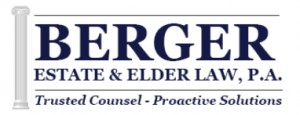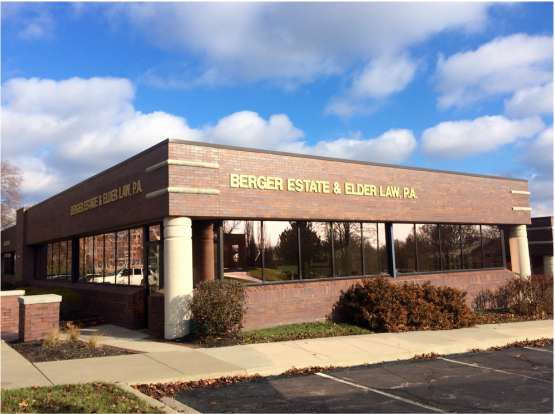RETIREES: DEDUCT YOUR LONG-TERM CARE INSURANCE PREMIUM
Berger Estate & Elder Law, P.A.
For more information about the author, click to view their website: Berger Estates and Elder law
Jan 12, 2024
Kansas/Missouri - Kansas City
Email US
Click to Email UsEven if you have a long-term care insurance policy, you may likely be hoping that you won't ever have reason to use it. Regardless of what the future holds, there's one silver lining of which you may not be aware. That is, premiums on many long-term care insurance policies are in fact tax-deductible.
What Is Long-Term Care Insurance?
Long-term care insurance, or LTCI, can help you prepare for covering the cost of care in a nursing home facility or other setting when and if you need it. Unfortunately, the likelihood that you’ll need long-term care services at some point is high. In fact, about 70 percent of older adults find themselves having to rely on at least some long-term care in their later years.
When individuals require long-term care, it means that they need assistance when completing activities of daily living (ADLs). These basic daily tasks include dressing oneself, showering, or moving safely from one place to another in one's household, such as from the bed to the bathroom, or in and out of one's chair. In most cases, your LTCI policy will begin covering long-term care services if you cannot perform at least two ADLs on your own.
The cost of LTCI policy premiums can be out of reach for many people, and some insurers have been raising premiums over the course of time. According to one 2022 survey by HCG Secure, a mere one in 10 of Americans older than 65 have a long-term care insurance policy. However, if you have purchased a tax-qualified plan, you may be able to deduct the insurance premium as a medical expense.
Is My Long-Term Care Insurance Policy Tax-Deductible?
You can deduct numerous types of medical and dental expenses
from your taxes. In addition to qualified long-term care insurance premiums,
other deductible health expenses include the following:
prescription medications and insulin
substance use disorder inpatient treatment or
smoking-cessation programs
prescription or reading eyeglasses
contact lenses
hearing aids
X-rays
artificial teeth
acupuncture treatments
the cost of caring for a guide dog for a person with a vision or hearing disability
When filing your 2023 federal income taxes, check with your insurance broker or state insurance commission to determine whether your LTCI policy qualifies.
Only certain long-term care insurance policies meet the criteria for a tax deduction. The National Association of Insurance Commissioners sets these rules. Typically, many hybrid long-term care policies do not qualify for a premium deduction. (For more information on what defines a qualified LTCI contract, consult the IRS’ Publication 502 for the current tax year.)
If your policy does qualify, you can deduct your LTCI policy premium up to a specified limit. Keep in mind that you will only be eligible for a tax deduction if all of your eligible medical expenses totaled more than 7.5 percent of your adjusted gross income for the year.
Select states also offer LTCI tax incentives, so be sure to check with your tax advisor. Note, too, that if you are self-employed, the rules regarding these deductions can differ.
How Much Can I Deduct in 2024?
If your annual LTCI policy premium is higher than the limit provided in the table below, it will count as a medical expense. The older you are, the higher your deductible limit. For example, if you are a 75-year-old individual at the end of 2023, you may be able to deduct up to $5,880 in LTCI premiums as qualified medical expenses.
There are lower deduction limits this year than in previous years. The Internal Revenue Service adjusts these limits each year.
The cost of long-term care services can in large part depend on where you live. Check out this online tool to get an estimate based on your ZIP code.
The ins and outs of LTCI products can prove to be
complicated. Consult with an experienced tax or elder law attorney in your
area. An elder law attorney can provide guidance on purchasing an LTCI policy
and also assist you in planning for the possibility that you will need
long-term care in the future.
- To view the original version of this article visit www.berger-lawfirm.com/blog/retirees-deduct-your-long-term-care-insurance-premium
- Seniors Blue Book was not involved in the creation of this content.
Other Articles You May Like
Estate Plan Check-Ups
Estate Plan Check-UpsEffective estate planning is personal, and its more than just deciding who to leave your assets to once you die. Effective estate planning is a comprehensive process that encompasses pre-need planning: health care decisions, financial management, and maintaining a delicate balance between independence and security. Like your preventive doctor visits, you should regularly check in on your estate plan to ensure it fits your current needs, considers and plans for potential future care needs, and will give effect to your wishes now and in the future. Generally, estate planning involves creating a last will and testament, possibly a revocable trust, possibly an asset protection trust or a supplemental needs trust for a loved one who is unable to manage finances or may be vulnerable to abuse or exploitation. Estate planning also involves important advanced directives, such as a durable financial power of attorney, a health care power of attorney, and a living will. Creating an estate plan, or getting my affairs in order, tends to be an item on our to-do lists, for us to get done and move on to the next thing. However, while it may not be something you have to look at every month, or even every year, once your initial estate plan is completed, it is something that needs to be reviewed with some regularity.Most people get an annual physical when they are healthy, not when they are sick. They do this because they want to proactively spot any issues that could cause them to become ill in the future. The same concept can and should be applied when it comes to reviewing and updating your estate plan. Your estate plan may be healthy now, but you want to make sure that it stays that way by checking it regularly, to ensure it fits your needs and family circumstances, protects and provides for you now, and accomplishes your goals and wishes in the future. Editors Note: This article is for informational purposes only and is not intended to be legal advice. This article was submitted by Ashley Day, Esq. Ashley Day Law, LLC. Reach her at 251-277-3377.
Nurturing Harmony in Caregiving: Open Communication and Conflict Prevention
Caring for aging parents involves crucial decisions regarding who will provide the necessary care and in what setting. However, these decisions can often give rise to conflicts among family members, particularly when one sibling assumes the role of primary caregiver. Through our work with clients and families, we frequently encounter these stressful and emotionally charged situations, creating a perfect storm for family disputes and distress.Reflecting on recent consultations with families, it becomes apparent that a key factor contributing to conflicts is the failure of aging parents to openly express their wishes and expectations regarding potential scenarios. When parents do not communicate their desires early and consistently, adult children are left to speculate about their parents preferences, leading to differences of opinion and sibling conflicts. To prevent such difficulties, we urge you to initiate conversations with your adult children about what if scenarios and discuss your wishes and preferences openly. This proactive effort can serve as your conflict prevention plan, saving you and your loved ones from engaging in conflict resolution in the future.In situations where a family member becomes a paid caregiver, it is essential to establish a formal caregiver agreement. This agreement serves multiple purposes, including clarifying the financial aspects of the care being provided. By having a caregiver agreement in place, you can prevent misunderstandings and promote a harmonious caregiving environment within your family. It ensures that everyone is on the same page and understands the expectations and parameters involved.Above all, open and honest communication is the key to fostering understanding and preventing conflicts among family members. We strongly recommend engaging in conversations early and frequently to address concerns, preferences, and potential challenges that may arise in caregiving situations. By doing so, you can promote a supportive and respectful environment where everyones needs are acknowledged and considered.At Bellomo & Associates, we believe in nurturing harmony within families facing caregiving challenges. Our experienced team is dedicated to providing comprehensive estate planning and elder law services that cater to your unique circumstances. Start the conversation with your adult children today, discussing your wishes, expectations, and potential what if scenarios. Visit our website to learn more about how we can support you and register for our free educational workshop. Let us help you pave the way for peaceful resolutions and a smoother caregiving journey.
Dealing with Deed Spam Mail
Have you recently purchased a home or made any changes to your propertys deed? Have you received an unexpected letter offering a copy of your deed for a fee? If so, youve likely encountered spam mail.Theres a company known as Land Solutions based in California that sends out Recorder of Deed Notices to individuals with newly recorded deeds. These notices claim that you can obtain a copy of your deed for a service fee of $109.00. Since the transfer of a deed is a matter of public record, they can easily access your name, address, and property information. While what theyre doing may not be a scam, we prefer to refer to it as spam. The truth is, the party responsible for transferring the deed, or even your local recorder of deeds, can provide you with a copy for a small fee or sometimes even for free. Theres no need to pay a separate company for this service.At Bellomo & Associates, many of our clients have received this type of letter, and we are delighted that they reached out to us before paying an unnecessary fee for a document we already possess on their behalf.When you receive such correspondence after making any changes, its crucial to research the company that sent it, reach out to the parties you were working with, and carefully read the fine print. In the case of these specific notices, the fine print typically states that it is not a bill but a solicitation, and you are not legally obligated to pay the amount requested.Together, we can minimize the impact of spam by working collectively and staying informed.
Local Services By This Author
Berger Estate & Elder Law, P.A.
Medicare & Medicaid Information 11233 Nall Ste 140, Leawood, Kansas, 66211Based in Leawood, Kansas, Berger Estate & Elder Law P.A. has been providing exceptional legal representation since 1987. Our attorneys are dedicated to developing long-term relationships with our clients and are committed to providing you with sensible solutions for complex legal problems.
Berger Estate & Elder Law, P.A.
Elder Law 11233 Nall Ste 140, Leawood, Kansas, 66211Based in Leawood, Kansas, Berger Estate & Elder Law P.A. has been providing exceptional legal representation since 1987. Our attorneys are dedicated to developing long-term relationships with our clients and are committed to providing you with sensible solutions for complex legal problems.
Berger Estate & Elder Law, P.A.
Estate Planning 11233 Nall Ste 140, Leawood, Kansas, 66211Based in Leawood, Kansas, Berger Estate & Elder Law P.A. has been providing exceptional legal representation since 1987. Our attorneys are dedicated to developing long-term relationships with our clients and are committed to providing you with sensible solutions for complex legal problems.



